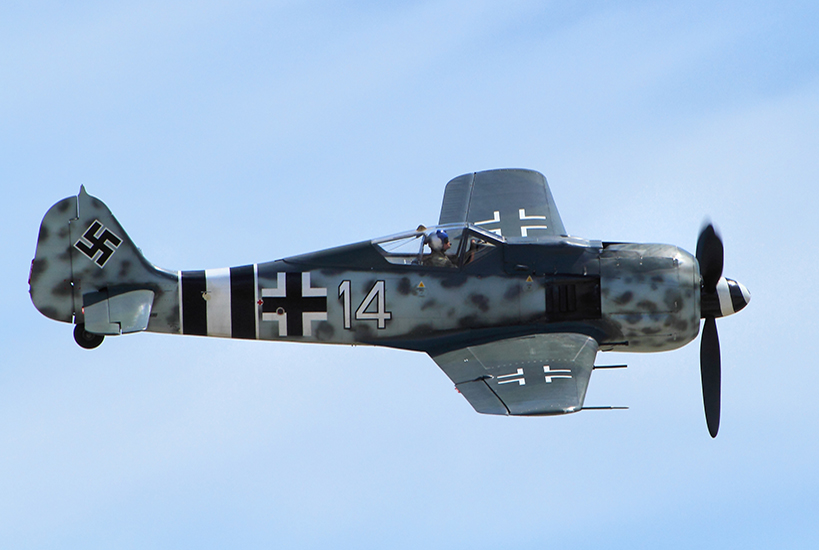Ingle, Alec
- Date of birth:
- February 15th, 1915 (Louth/Lincolnshire, Great Britain)
- Date of death:
- July 31st, 1999
- Nationality:
- British
Biography
Service number 83980.
Alec Ingle was educated at Pocklington School, East Yorkshire. He was later employed in Electrical Power Distribution Yorkshire and Lancashire.
In 1937 he joined the Royal Air Force Volunteer Reserve and was mobilised on 1st September 1939.
He was commissioned and posted to 605 Squadron, then at Drem in East Lothian in 1940. By November he had been promoted to Flight Commander and had been shot down three times. In July 1941 he was posted to 59 OTU as an instructor where he received the AFC and promoted to Squadron Leader. On the 5th May 1943 he was posted to the command of 609 Squadron where he led the squadron on anti-shipping strikes in their Typhoons. To the pilots of the squadron, these strikes became known as "Ingles tour of the Dutch Islands". By August he had been promoted to Wing Commander and posted to command No 124 Wing. At 03.30 one morning, Ingle was surprised to see a Focke Wulf Fw190 landing, but thinking quickly, he chased after it in the squadron car and, not being armed, arrested the pilot, Heinz Ehrhardt, by pointing his finger at him. The unfortunate pilot had mistaken the Thames estuary for the Channel, and thought he was landing at St Omer.
On the 11th of September 1943 he was in combat with Fw190's when his aircraft blew up. As his aircraft disintegrated around him, he managed to get out at an altitude of around 300 feet. Fortunately his parachute opened up just in time and was captured on landing and after attending his facial and leg burns, was taken to Stalag Luft III. A few weeks before The Great Escape took part, he was moved to a subsidiary camp at Belaria, where he was eventually joined by Roland Beamont. Together with some 25,000 prisoners and forced workers of varying nationalities, they took part in what was called "The Great March West". He finished the war with 5 confirmed victories.
Following repatriation, Ingle was posted back to Fighter Command to take command of the airfield at West Malling in Kent and later other bases. After graduating from the RAF Staff College at Bracknell several other positions followed.
In January 1965 he was one of the 13 Battle of Britain pilots to head the funeral procession of Sir Winston Churchill and retired as a Group Captain in 1966.
Ingle became a keen sailor, and he owned a variety of sailing yachts. He was also for many years politically active for the Conservative Party and worked in several functions on planning and financial matters.
Promotions:
June 18th, 1940: Pilot Officer (probation)
June 18th, 1941: Flying Officer
January 21st, 1942: Flight Lieutenant (war sub)
November 19th, 1943: Squadron Leader (war sub)
January 1st, 1952: Wing Commander
July 1st, 1960: Group Captain
Do you have more information about this person? Inform us!
- Period:
- Second World War (1939-1945)
- Rank:
- Acting Squadron Leader
- Awarded on:
- January 1st, 1943
Awarded for flying a badly burned pilot to hospital at Cosford in hazardous conditions.
- Period:
- Second World War (1939-1945)
- Rank:
- Acting Squadron Leader
- Unit:
- No. 609 (West Riding) Squadron, Royal Air Force
- Awarded on:
- August 17th, 1943
"This officer has completed many sorties. By his exceptional skill and leadership he has contributed in a large measure to the successes obtained by the squadron which, within recent weeks, has damaged some 15 ships. Squadron Leader Ingle, who has destroyed 5 enemy aircraft has rendered fine service."
Sources
- - Second Supplement to The London Gazette Issue 35841 published on the 29 December 1942
- Second Supplement to The London Gazette Issue 36135 published on the 13 August 1943
- 609 WR Squadron
609 West Ryding Squadron Archives





